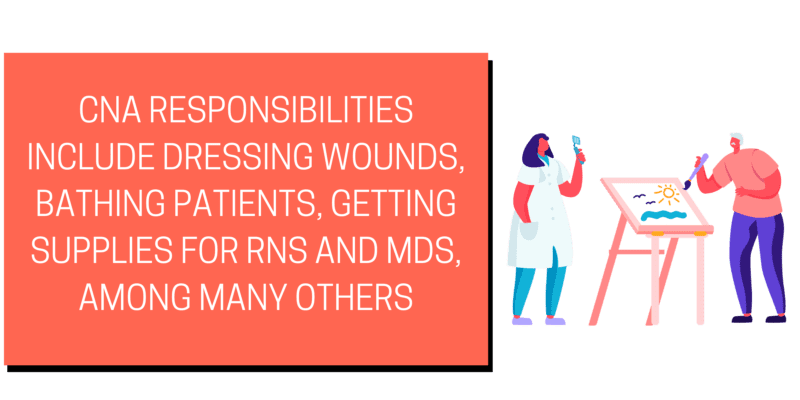Key Takeaways:
- Becoming a Certified Nursing Assistant (CNA) is a quick entry into the nursing field, often requiring only weeks of training.
- CNAs provide essential patient care under the supervision of registered nurses, including basic medical and personal care.
- The demand for CNAs is high, with expected growth due to healthcare needs, offering a stable career path.
- CNA programs are accessible and affordable, often available at community colleges and healthcare facilities, and require a state competency exam.
A CNA degree or certification trains individuals to work as Certified Nursing Assistants and provide care to patients in different settings. Best Health Degrees want to help you find a pathway into medicine. We want you to learn what it will take to succeed before you begin an educational degree or certification so you make informed decisions and don’t waste your time and money. One of the ways we accomplish these goals is by profiling different nursing roles.
Nursing is a remarkably selfless career path. You’ll work on the front lines of treating patients directly, coordinating their care, and taking care of their essential needs. It’s exceptionally admirable and rewarding. Unlike many other professions, you’ll see the utility of your work every day.
Being a nurse is complicated and arduous. If you want a career in nursing, you’ll need to train vigorously, stay current with the ever-shifting medical field, and complete various degrees and certifications to maintain or enhance your position and job opportunities.

Nurses are constantly moving. It’s estimated that a nurse walks four to five miles every 12-hour shift (nurses are often required to work 12-hour shifts or longer). During that time, they often treat between one to eight patients, although this highly depends on the environment and facility they work in.
As a nurse, you’ll be joining an ancient tradition. Records of nurses extend back to 300 AD in the Roman Empire. The Roman Empire wanted hospitals in every town under their control. Over the following centuries, as the Catholic Church, Charlemagne, and eventually more localized rulers supplanted the Roman Empire as influential organizations in Europe and across the world, nursing developed dramatically. Throughout, one thing remained consistent: a strong need for nurses. That need continues today.
Certified Nursing Assistant (CNA) Job and Education Details
Currently, there’s a far higher demand for qualified nurses than a supply of them. Nursing, and the medical field overall, are expected by many sources to grow drastically over the coming years. It’s not only demand that makes nursing desirable. In 2018, US News and World Report published a list of the 25 Best Jobs for Americans. Three of the top 25 were in nursing.
Skip To
- What is a CNA? What is a CNA Degree or Certification? How Do You Earn One?
- What do CNAs Do?
- Ask Yourself and Consider the Following About Your CNA Education and Career
- How Can We Help You In Your Nursing Education and Career?
- What Can You Expect to Earn as a CNA? What’s CNA Employment Like?
The nursing population is booming. In 2016 there were 4 million nurses in America. Between 2013 and 2016, 500,000 new nurses joined the field. This trend has continued for a while: the total number of nurses has tripled since 1970, and the number of American nurses increased more than the overall American population in the 2000s!
When we think of nurses, we generally think of Registered Nurses. In 2020 there were nearly 3.08 million registered nurses in the country. However, many working nurses haven’t yet achieved the RN title but are vital participants in the nursing field.
Just like in other career paths, nursing has multiple entry points. You should select a subsection of nursing that suits your needs and goals. What’s best for you can feel murky. But it relies on many factors you can weigh and consider (more on that later). However, if you’re starting to work, or looking for a new career, an excellent option for beginning a career in nursing is earning a Nursing Assistant (CNA) Degree or Certification. So, what does that entail and what degree do you need to be a nurse assistant?
What is a CNA?
CNAs are Certified Nursing Assistants. They provide principle care to patients in many different healthcare settings, including clinics, nursing homes, long-term care facilities, and hospitals. CNAs work under the oversight of licensed or registered nurses.
What is a CNA Degree or Certification?
What degree do you need to be a CNA? These workers don’t necessarily need a higher degree. In general, they complete CNA training programs, or a CNA certification, required by their state. These CNA programs take four to sixteen weeks to complete. There are also some other education requirements for nursing assistants. You’ll need a high school diploma or GED, must complete a number of clinical hours (differing state to state), and then pass a nurse aide competency exam. This exam has a written section and a practical skill-based part as well. After completing these requirements, they are put on a state registry and get a certification as nursing assistants.
How Do You Train to Be a CNA?
Becoming a certified nursing assistant consist of classroom education and clinical training followed by certification. Federal law mandates that certified nursing assistant CNA programs provide a minimum of 75 hours of training with at least 16 hours of supervised practical or clinical training. However, many states set criteria that exceed these standards and they require nursing assistants to complete more hours of training. Additionally, students should attend a state approved training program.

1. Have the Minimum Requirements
A high school diploma or GED is a minimum requirement to enroll in professional CNA training programs. You’ll need to satisfy some prerequisites to qualify for a certified nursing assistant CNA training program. These also vary by state but can include:
- Passing a physical exam and tuberculosis screening
- Passing a criminal background check
- Completing an orientation session
- Having a high school diploma or equivalent credential
2. Complete a CNA Training Program
In some cases, certified nursing assistant training may be provided to successful candidates for free or low cost. This is a great way to save money compared to other nursing programs, which can cost thousands of dollars. The time to complete one of these CNA education requirements is 4-12 weeks.
While a CNA is considered an entry-level position, you’ll need the appropriate education and clinical training to work in this role. Federal law requires that certified nursing assistant programs provide a minimum of 75 hours of training with at least 16 hours of supervised practical or clinical training. However, many states set criteria that exceed these standards. Your complete program time includes both instructional hours and clinical practice. State guidelines determine the minimums for each category. As an example, a 120-hour, six-week CNA program may include four weeks of classroom education and two weeks of clinical practice
It’s critical to ensure that your CNA program meets your state’s CNA educational requirements. Check with your state board of nursing or department of health to avoid selecting a program that doesn’t meet your state’s criteria.
CNA coursework is offered through the Red Cross, vocational schools, community colleges, vocational colleges, and other settings, depending on where you live. You can also train to become a certified nursing assistant by taking CNA classes through technical schools, hospitals, nursing homes, and other medical facilities.

Classroom education
Below are some topics students study in certified nursing assistant or CNA programs.
- First Aid, CPR, and Emergency Procedures
- Basic medical terminology
- Human Anatomy and Physiology
- Oral and topical medication management
- Communication skills
- Controlling and Preventing Infection
- Nursing and patient safety
- Collecting and reporting on data
- Mental health issues, needs, and responsibilities
- Cultural differences and needs
- Patient and client rights
- Laws and Ethics Governing Nursing
- Long-term care
- Specialized population care for the elderly, infants, and other groups
- Specialized medical condition care like diabetes or cognitive impairment
- Mastery of medical technology
- Patient advocacy and support
- Proper use of medical records software
- Safety protocols
Clinical Training
- Direct patient care and CNA duties
- Basic activities in daily life for CNAs and patients
- Proper body mechanics to protect yourself and your patient
- Safe transfer and lifting procedures
- Maintenance of a safe and clean environment
- Taking vital signs, like measurement and reporting blood pressure and other vital signs
- Personal care skills Daily personal hygiene and personal care management
3. Pass Your State CNA Competency Exam
CNAs earn a credential that can help them begin a rewarding career with plenty of room for growth. The written part of the CNA certification exam addresses many pressing issues you’ll face in your career, and some you may find surprising. There are several practice test resources you can find on the web.
Most states require that prospective CNAs pass a competency exam. Each state can use its own CNA competency exam. However, currently, twenty states use the National Nurse Aid Assessment Program (NNAAP). This is an exam developed by the National Council of State Boards of Nursing (NCSBN).
The test consists of approximately 70 multiple-choice questions. They convert topics like patient care and take around two hours to complete. A clinical skills exam is a hands-on evaluation portion of the exam that takes another 25 to 45 minutes. Students demonstrate five skills in the allotted time.

4. Maintain Your CNA Certification
You’ll need to be recertified every 24 months in many states to maintain your CNA certification. Recertification often consists of 48 hours of continued education. You might be retrained in domestic violence, medical record documentation, first aid, and also patient rights.

What Do CNAs Do?
CNAs are the foot soldiers of nursing. In many facilities, due to the high demands on RNs and LPNs, they may be the primary caregiver to many patients. They need to be superbly compassionate, upbeat, energetic and take absolute pleasure in helping people with serious medical issues.
Important Skills and Traits
You’ll need spectacular communication skills and a vast well of humility. You must be comfortable reporting to superiors because everyone you’ll work with (other than fellow CNAs) will be above you. So, what can you do with a CNA certificate?

CNA Job Duties and Daily Responsibilities
Let’s dive into the daily responsibilities of CNAs. Some of the responsibilities CNAs take on include:
- Assisting superiors with medical procedures
- Stocking medical supplies
- Dressing and cleaning wounds
- Lifting, adjusting, repositioning, and turning over patients. This can involve putting patients into wheelchairs, exam tables, and beds.
- Serving meals, feeding patients, and documenting what they ate
- Providing bedpans, emptying them, and helping patients go to the bathroom
- Taking and recording vital signs
- Monitoring patients and attending to their calls
- Dressing and bathing patients
- Changing bedding and cleaning patient rooms
- Retrieving supplies for nurses and doctors
- Transporting patients to treatment units, operating rooms, and other medical facilities
- Working with medical technology, including medical record charting software, billing software, and health information software
- Administering medication to patients
- Serving as a liaison between patients, families, doctors, nurses, and other medical staff
CNAs complete many tasks, and they must do so on the bounce. It’s not easy work and not for the faint of heart or people who are easily grossed out. You might see graphic things, including devastating injuries, violence, and biological processes that aren’t pretty. However, suppose you can handle the rougher aspects of this work. In that case, you’ll build strong camaraderie with your coworkers and have secured a position in a field with many opportunities for advancement. Not all CNAs rush to achieve further positions. The National Network of Career Nursing Assistants notes that 28% of CNAs work in the role for at least five years, and at least 13% stay a certified nursing assistant for 10-55 years.
Where Do Certified Nursing Assistants (CNAs) Work?
The specific tasks certified nursing assistants perform during the workday depends to a great extent on where they work. While most certified nursing assistants work in nursing homes, retirement communities, hospitals, and home care, there are other places to use your knowledge and skills.
Nursing Care Facilities
Hospitals
Home Healthcare Services
Memory Care Homes
Government Clinics
Outpatient Care Centers
Junior Colleges
Elementary and Secondary Schools
Insurance Carriers
Religious Organizations
Continuing Care Retirement and Assisted Living
Scientific Research and Development Services
Ask Yourself and Consider the Following About Your CNA Education and Career
Now let’s look at how you should decide whether to become a CNA, along with where and how you should get CNA training:
Will you be highly motivated by this work?
The work of a CNA is sometimes grueling, painful, and rough. Even though the training for a CNA position is far less than other medical degrees or certifications, it’s still not something you should waste your time on if it’s not for you. Think hard about whether you’re a good fit for this position. Consider volunteering at long-term care facilities, rehabilitation centers, nursing homes, assisted living facilities, or other medical organizations. On the job training is a great way to get a sense of the work and to experience doing it. If you’re sure nursing is for you, how far do you want to go in your career?
What are your Career Goals?
What are your short, mid, and long-term career goals in nursing or other medical professions? Is becoming a CNA a good first step for you, or should you study and become an RN or Licensed Practical Nurse (LPN) straight away? You can complete a CNA education program much quicker than you can get an RN or LPN certification. However, by the time you get a CNA certification, a job, and work in it for a while to get your feet wet, you might spend enough time in the field to have earned a different certification. Weight the pros and cons of quick entry into nursing against higher pay and a more impressive credential.
Where do you want to live and work?
Some cities and states have higher pay for CNAs. The top states for CNA pay are Alaska, New York, Hawaii, California, and Nevada. You might consider a CNA training program in the area you want to work in. It’s not necessary, but the program you train under might be able to connect you to more local opportunities than CNA jobs further away. One thing you have on your side is the high demand for nurses and the growing demand for certified CNAs
How long can you commit to a CNA program? Some certified nurse assistant programs take longer than others to complete. Make sure to find all the specs governing any CNA program you’re considering.

These are just some of the questions and considerations you should be mulling over when you’re choosing a CNA program or whether to pursue one at all. You can help yourself decide by discussing these questions with family, friends, experienced nurses, other healthcare professionals, program facilitators, and anyone you trust. Answering these questions can also be very useful in your decision-making process.
How Can We Help You In Your Nursing Education and Career?
Now let’s explore how we can help you in your hunt for a nursing program and in search for a nursing position. Here at Best Health Degrees, we’ve worked diligently to offer aspiring nurses a litany of informative content. We’ve ranked degree programs, including traditional and online offerings. We’ve prepared resources to help you decide what roles you should pursue in your medical career, and show you what opportunities exist once you’ve earned credentials, degrees, and certifications. We’re also committed to answering common questions describing roles in the field, their differences, and much more. Some of our pertinent content can be found below.
If you find any program through our work that you’re interested in, you should contact its support staff directly. Usually, they’ll be happy to answer questions about their program and can give you valuable insight into whether it’s for you. You can learn about costs, timelines, and how to be successful from experienced professionals with an intimate understanding of any program you’re considering.
Rankings
- 25 Best Master’s in Healthcare Administration
- 15 Best Online Master’s in Healthcare Administration
- 15 Best Online MSN Degree Programs
- 25 Online Master’s in Nursing and Healthcare Informatics
- 15 Best Master’s in Nursing and Healthcare Informatics
- 15 Best Online BSN Degree Programs
- 25 Best Traditional BSN Degree Programs
Resources
- What Can I Do with a Bachelor’s in Nursing?
- What Can I Do with a Master’s of Science in Nursing?
- What Can I Do with a Master’s in Health Informatics?
- What Can I Do with a Master’s in Healthcare Administration?
Common Questions
- What is a Nursing Assistant?
- What is the Difference Between a CNA and an LPN?
- What is a CNA?
- Can You Get a Degree in Nursing Online?
- What is a Long-Term Care Nurse?
- What is a Hospice Nurse?

What Can You Expect to Earn as a CNA?
CNAs are at the bottom of the earning ladder for nurses, but as we’ve discussed, there’s significant room for advancement in the field. After earning your CNA credential and working, you can qualify to begin training as an RN or LPN, although you may need to obtain a Bachelor’s degree. However, the time you log as a CNA will go a long way towards preparing you to gain further certifications, and you’ll likely work with more experienced and credentialed nurses.
Here’s some information about RN employment courtesy of the United States Bureau of Labor Statistics.
- In 2020, Registered Nurses made a median wage of $77,600 yearly
- In 2020 there were 3,080,100 employed Registered Nurses (RNs)
- Expected RN job growth of 9% from 2020 to 2030
What are the Numbers for CNA Employment?
BLS also offers information on Nursing Assistants and Orderlies. They define these roles as people who work providing primary care for patients in hospitals and residents of long-term care facilities.
| Nursing Assistants Quick Facts | BLS 2021 Info |
|---|---|
| Median Annual Wage | $30,310 |
| Pay Range | $23,880 to $46,470 |
| Job Growth 2020 to 2030 | 8% |
| Nursing Assistants employed | 1,396,700 |
Largest Employers
Nursing assistants held about 1.4 million jobs. The highest level of employment for Nursing Assistants was found in the following industries in May 2020.
| Industry or Sector | % Employed |
|---|---|
| Skilled Nursing Care Facilities | 37% |
| Hospitals | 30% |
| Retirement Communities or Assisted Living | 11% |
| Home healthcare services | 6% |
| Government | 4% |
Highest Salaries
In May 2021, the median annual wages for nursing assistants in the top industries in which they worked were as follows.
| Industry or Sector | Annual Salary |
|---|---|
| Government | $37,310 |
| Hospitals | $35,870 |
| Skilled Nursing Care Facilities | $29,970 |
| Retirement Communities or Assisted Living | $29,900 |
| Home Health Care Services | $29,280 |
CNA Specialty Certifications
A great way to earn more as a CNA is to expand your skill set. This can mean gaining a different credential or additional specialty certification. One excellent option is to become a PCT or Patient Care Technician. PCT’s can take on CNA responsibilities and do some work in the fields of electrocardiogram and phlebotomy.
After you’re certified, you can earn optional professional certifications to expand your skills and stand out in the field of job applicants. To earn a specialty CNA certification, you must meet the education and experience requirements of the certifying organization. Some common CNA specialty certifications and the organizations that award them include.
- CNA II: Available in some states to CNAs with specified experience and/or training
- Certified Alzheimer Caregiver: Offered through the National Certification Board for Alzheimer Care
- Certified Hospice and Palliative Nursing Assistant: Offered by the Hospice and Palliative Nurses Association
- Certified Wound Care Associate: From the American Board of Wound Management
- Medication Aide Certification: The National Council of State Boards of Nursing, Inc.
Your CNA Career
CNAs don’t have the same training as RNs or LPNs (licensed practical nurses), aren’t as skilled, and don’t get paid as much. However, they often work just as hard as the nurses above them, and many certified nursing assistants. Many who complete the education requirements for certified nursing assistant use this credential as a launchpad to higher degrees and certifications in nursing.
Also, many nursing students work as Certified Nurse Assistants (CNAs) during nursing school. They can learn and make money while they train to be a Registered Nurse or Practical Nurse. And they add to their basic patient care and time-management skills. We hope you’ve found this guide informative and illuminating. Good luck in your nursing career!